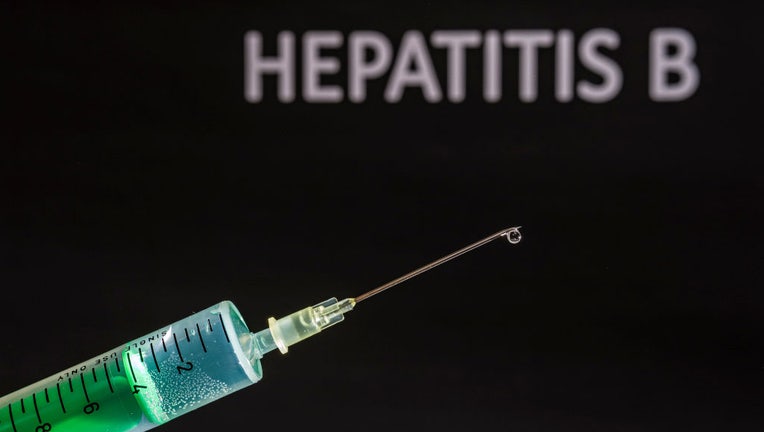Three-dose hepatitis B vaccine regimen protects people with HIV, study finds

FILE-his photo illustration shows a disposable syringe with hypodermic needle, HEPATITIS B written on a black board behind. (Photo Illustration by Frank Bienewald/LightRocket via Getty Images)
People living with HIV now have protection from hepatitis B through a three-dose vaccine based on new data reported in a study, the National Institutes of Health (NIH) shared in a release on Oct. 20.
The three-dose hepatitis B vaccine (HEPLISAV-B) fully protects adults with HIV who had never been vaccinated against or infected with the hepatitis B virus (HBV). Research from the study was shared during a recent conference in Washington, D.C.
Sixty-eight adults with HIV were given the vaccine by researchers at 38 sites in the United States, South Africa, and Thailand. None of the participants tested previously received or had exposure to the HBV infection, the NIH offered.
Side effects people experienced after taking the vaccine were pain from the injection, fatigue, muscle aches, and headaches. After their initial dose of the vaccine, participants were given extra doses at four weeks and 24 weeks, the NIH offered.
The HEPLISAV-B vaccine was created by California-based company Dynavax Technologies Corp and was approved in 2017 by the Food and Drug Administration (FDA) as a two-dose vaccine regimen for adults. At the time, there wasn’t much information on the vaccine’s effectiveness in protecting people with HIV, according to the NIH.
What is hepatitis B?
Hepatitis B is a vaccine-preventable liver infection caused by the hepatitis B virus (HBV). The Centers for Disease Control and Prevention (CDC) explains Hepatitis B virus (HBV) and HIV are bloodborne viruses spread through sexual contact and injection-drug use. The CDC explains a high number of adults at risk for HIV infection are also at risk for HBV infection based on these acts.
Individuals with HIV who become infected with HBV are at increased risk for liver-related illnesses and death. Additionally, people infected with HBV may not have symptoms of the virus. However, those with symptoms may experience fatigue, poor appetite, stomach pain, and nausea, the CDC offered.
This story was reported from Washington, D.C.

